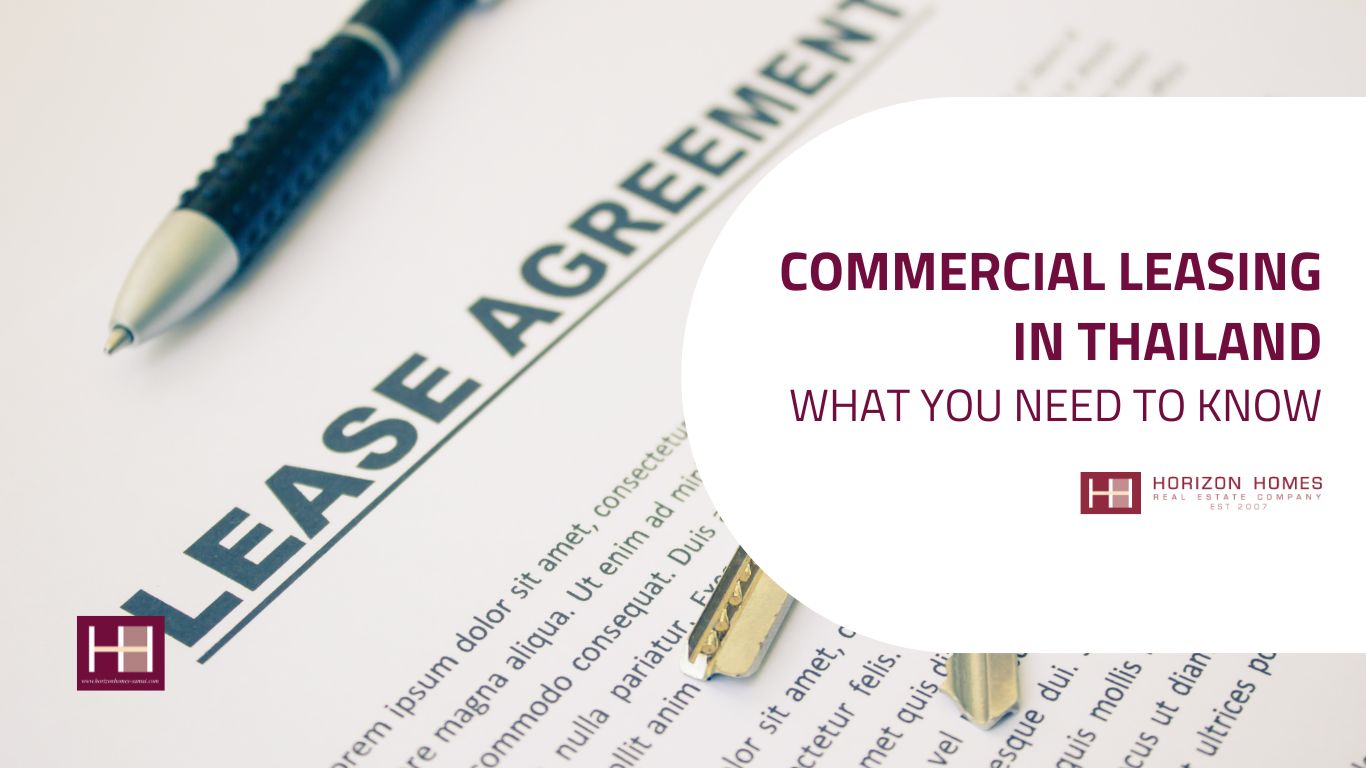Whether you’re a landlord or tenant, understanding the ins and outs of lease agreements is essential for a smooth and successful business experience. In this guide, we’ll break down everything you need to know about commercial lease agreements in Thailand—from the key components and types of leases to renewal processes and legal requirements for foreigners.
What is a Commercial Lease Agreement?
A commercial lease agreement in Thailand is a legally binding document that outlines the terms and conditions for renting property for business purposes. This agreement serves as the foundation of your business operations and ensures that both parties—landlord and tenant—are clear on expectations and responsibilities.
These agreements are governed by the Civil and Commercial Code and the Lease of Immovable Property for Commercial or Industrial Purposes Act of 1999. While these laws provide a solid framework, it’s crucial to understand the specifics of each agreement to safeguard your interests.
For a deeper comparison of the pros and cons of owning vs. leasing commercial property, check out our full guide on this topic.
Key Components of a Commercial Lease Agreement
When entering a commercial lease, there are several essential components to consider. Here are the key aspects you’ll encounter:
- Authorized Activities: This clause outlines what business activities are allowed. It ensures that you’re not stepping into legal trouble by running a business that’s outside the scope of the agreement.
- Rent Details: The agreement specifies how much you’ll pay and when. This includes not only rent but also any additional fees for maintenance, utilities, or shared expenses.
- Lease Duration: Lease terms can vary, but it’s crucial to know the exact length of your commitment. The agreement will clearly define the start and end dates.
- Payment and Penalties: Understand when rent is due and the penalties for late payments. This section is essential to avoid any surprises down the road.
- Security Deposit: Typically, this covers two to three months of rent and serves as a guarantee against property damage or unpaid rent. Be sure to clarify the conditions under which it will be returned.
- Shared Charges: This refers to any costs that are divided between you and other tenants, such as cleaning, security, or property maintenance.
- Insurance: Depending on the nature of your business, you may be required to get insurance. This clause helps protect both you and the landlord from unforeseen events.
- Maintenance and Repairs: This section specifies who is responsible for maintaining the property and making repairs, so everyone knows what’s expected.
- Breach and Liability: If either party breaches the contract, this section outlines the consequences, including potential penalties or termination of the lease.
Types of Commercial Lease Agreements
| Lease Type | Description |
| Gross Lease | Rent includes all property expenses, such as utilities, maintenance, and taxes. Simple and all-inclusive. |
| Net Lease | Tenant pays rent plus a portion of the property’s operating expenses, like property taxes and insurance. |
| Percentage Lease | Rent is tied to a percentage of the tenant’s sales, commonly used in retail spaces, malls, and shopping centers. |
| Modified Net Lease | A hybrid lease where some expenses are covered by the landlord and others by the tenant. Negotiations are key in determining the split. |
How Long is a Commercial Lease Agreement?
Commercial lease terms can be tailored to your needs:
- Short-Term Leases: Typically lasting a year or less, these leases are great for businesses testing the waters.
- Medium-Term Leases: Ranging from two to five years, these leases provide more stability without long-term commitment.
- Long-Term Leases: Lasting up to 10 years, these leases are ideal for businesses looking for long-term security and planning for the future.
Can a Commercial Lease Be Terminated Early?
Breaking a lease in Thailand isn’t a simple matter. Landlords have the right to terminate the lease if tenants breach the contract, such as by failing to pay rent. However, tenants are usually given a “remedy period” (30 to 90 days) to rectify the breach before eviction occurs.
Tenants can’t generally terminate a lease early unless the landlord fails to meet their obligations. If you plan to exit early, ensure the lease has an early termination clause that clearly defines the conditions and penalties.
When leaving, be prepared to restore the property to its original condition, and expect that the landlord might request additional compensation. Always follow the notice period in the lease—usually three months—when notifying your landlord of your intention to vacate.
How to Renew a Commercial Lease
Renewing a commercial lease in Thailand requires foresight and proactivity. The lease doesn’t automatically renew; you’ll need to request it before the current lease expires. If you’re looking to renew, remember that terms may change, including rent increases and other conditions.
It’s vital to review the renewal clause in the lease agreement, as some leases offer a clear renewal option while others may not. If the terms are unclear, consider consulting a lawyer to ensure that your rights are protected during the negotiation process.
Legal Requirements for Foreigners
Foreigners looking to lease commercial property in Thailand can lease property for up to 30 years, but they cannot own land outright. Leases must be in Thai and registered with the local land office to be enforceable.
It’s also essential to have professional legal assistance when drafting or reviewing lease agreements. A lawyer can ensure that the terms are clear, fair, and compliant with Thai law. Keep in mind that you’ll need to follow all local regulations, especially if you’re considering transferring the lease or negotiating lease extensions.
Conclusion
Commercial leasing in Thailand offers great opportunities for businesses, but it comes with its share of legal intricacies. By understanding the key components of lease agreements, the types of leases available, and the termination and renewal processes, you can protect your interests and set your business up for success. Whether you’re a landlord or tenant, being well-informed and prepared to negotiate can make a significant difference in your leasing experience. If you’re a foreigner, working with legal professionals ensures that your rights are secure throughout the lease term.
Stay proactive, keep your lease terms clear, and always communicate openly with your landlord to ensure a smooth and successful leasing journey in Thailand.



